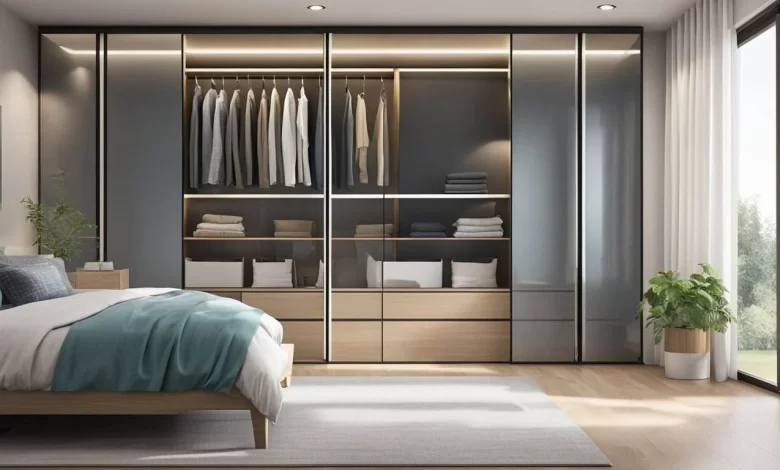Maximizing Space and Style: A Complete Guide to Sliding Wardrobe Doors

Features: Space-saving: Unlike traditional hinged doors, sliding doors don’t require extra room to open, making them ideal for smaller spaces. Smooth Gliding Mechanism:
Most sliding wardrobe doors feature a rail or track system that allows them to glide effortlessly.
Customizable: Sliding doors can be tailored to specific dimensions, making them adaptable to various wardrobe sizes and layouts.
Mirror Options: Many sliding doors come with mirrored panels, serving dual purposes—making rooms look larger and providing a full-length mirror.
Benefits: Maximises Space: As they don’t swing open, sliding doors allow for more usable space in the room.
Aesthetic Appeal: With a range of materials and finishes available, sliding doors can complement modern and traditional decor styles.
Enhanced Accessibility: Sliding doors offer a wide opening when both doors are slid to the side, providing easy access to your wardrobe contents.
Increased Storage Flexibility: By not requiring clearance for opening, sliding doors make it easier to position other furniture nearby, such as beds or drawers.
Minimal Maintenance: Sliding doors typically require less maintenance than traditional doors since they have fewer moving parts.
Styles: Contemporary/Modern: Sleek, minimalistic designs with glass or high-gloss finishes.
Traditional: Wood finishes, often with panelling or framed designs for a more classic look.
Shaker Style: A mix of modern and traditional, featuring flat panels and clean lines. Rustic: Wooden sliding doors with natural grain patterns, often used in farmhouse or country-style bedrooms.
Industrial: Metal and glass combinations, often with darker, matte finishes.
Materials: Glass: Frosted, tinted, or mirrored glass can create a modern and airy feel. Mirrored doors are particularly popular for adding a sense of space to small rooms.
Wood: Solid wood or wood veneer offers a warm, natural look and can be stained or painted to suit different tastes.
MDF (Medium Density Fiberboard): A more affordable option, MDF can be painted or coated with various finishes, including wood effect, gloss, or matt.
Aluminum Frames: Common in modern designs, aluminum frames offer a sleek and durable solution, often paired with glass panels.
Laminate or Vinyl: These materials can mimic the appearance of wood or other textures, offering a budget-friendly and durable alternative.
Kits & DIY: Many sliding wardrobe door manufacturers offer kits for DIY installation, which typically include: Tracks and Rails: For smooth sliding of doors. Rollers or Gliders: To ensure easy movement.
Frames: Made from aluminum or steel, holding the panels in place. Panels: These can be pre-cut or customizable, depending on the kit.
Instructions and Fixings: Easy-to-follow guides for DIY enthusiasts, with all necessary parts included.
DIY Tips: Measure Accurately: Ensure you have precise measurements of the space for a proper fit.
Choose Quality Materials: Opt for durable materials that can withstand regular use. Track Installation: Make sure the track is level to ensure smooth door operation.
Align Doors Correctly: Once installed, check that the doors are level and slide smoothly across the track. Safety First: Use proper tools and wear protective gear, particularly when cutting panels or drilling.
Colours: Neutral Shades: White, beige, and soft greys are common for modern or minimalist designs.
Bold Colours: Bright shades like royal blue, red, or emerald green can create a focal point in the room.
Wood Tones: From light oak to rich walnut, wood tones offer a classic, warm aesthetic.
Metallics: Sleek silver, gold, or black frames paired with mirrored or glass doors give a contemporary, high-end look. Designs: Full Panel Sliding Doors: Simple and sleek, offering a streamlined appearance.
Split Panel or Combo Designs: Mixing materials like glass and wood or using different sections to create a unique design.
Textured or Embossed Panels: Panels with raised textures or patterns to add depth and interest. Mirrored Panels: Full-length mirrors are a practical and stylish option, making the room feel larger and brighter.
Frosted or Tinted Glass: For a more modern, translucent effect, allowing light through without fully revealing the wardrobe’s contents. Bedroom Storage Ideas with Sliding Wardrobe Doors.
Built-in Shelving: Behind the sliding doors, incorporate adjustable shelves for efficient storage of clothes, accessories, and shoes.
Hanging Space: Utilize double hanging rods to maximize space for shirts, jackets, and dresses.
Drawers and Baskets: Combine sliding doors with interior chest of drawers or pull-out baskets for items like socks, belts, and jewelry.
Integrated Lighting: LED strip lighting inside the wardrobe can illuminate the interior when the doors slide open.
Conclusion:
Sliding wardrobe doors offer a range of customizable options in terms of materials, colours, and designs, making them a versatile choice for any bedroom.
They combine practicality with elegance, offering efficient use of space, a modern look, and easy access to stored items.
Whether you’re looking for a DIY project or professional installation, sliding wardrobe doors can enhance both the functionality and style of your bedroom.





